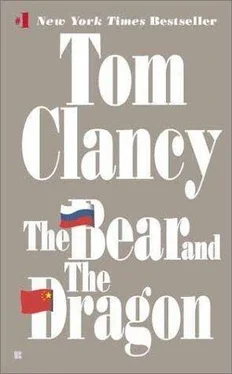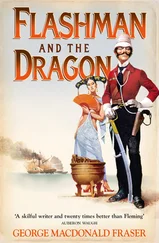Tom Clancy - The Bear and the Dragon
Здесь есть возможность читать онлайн «Tom Clancy - The Bear and the Dragon» весь текст электронной книги совершенно бесплатно (целиком полную версию без сокращений). В некоторых случаях можно слушать аудио, скачать через торрент в формате fb2 и присутствует краткое содержание. Год выпуска: 2001, ISBN: 2001, Жанр: Триллер, на английском языке. Описание произведения, (предисловие) а так же отзывы посетителей доступны на портале библиотеки ЛибКат.
- Название:The Bear and the Dragon
- Автор:
- Жанр:
- Год:2001
- ISBN:780425180969
- Рейтинг книги:3 / 5. Голосов: 1
-
Избранное:Добавить в избранное
- Отзывы:
-
Ваша оценка:
- 60
- 1
- 2
- 3
- 4
- 5
The Bear and the Dragon: краткое содержание, описание и аннотация
Предлагаем к чтению аннотацию, описание, краткое содержание или предисловие (зависит от того, что написал сам автор книги «The Bear and the Dragon»). Если вы не нашли необходимую информацию о книге — напишите в комментариях, мы постараемся отыскать её.
The Bear and the Dragon — читать онлайн бесплатно полную книгу (весь текст) целиком
Ниже представлен текст книги, разбитый по страницам. Система сохранения места последней прочитанной страницы, позволяет с удобством читать онлайн бесплатно книгу «The Bear and the Dragon», без необходимости каждый раз заново искать на чём Вы остановились. Поставьте закладку, и сможете в любой момент перейти на страницу, на которой закончили чтение.
Интервал:
Закладка:
“Yes? So, what, then, is the difficulty?”
“Fang, Butterfly just canceled an order worth one hundred forty million American dollars. They did it without any warning. Only last week they told us how happy they were with our products. We’ve invested a fortune into quality control to make sure they would stay with us-but they’ve left us like a dog in the street.”
“Why did this happen, Ren?” Minister Fang asked, fearing he knew the answer.
“Our representative in New York tells us that it’s because of the deaths of the two clergymen. He tells us that Butterfly had no choice, that Americans demonstrated outside his establishment in New York and prevented people from going inside to buy his wares. He says that Butterfly cannot do business with me for fear of having their own business collapse.”
“Do you not have a contract with them? Are they not obligated to honor it?”
Ren nodded. “Technically, yes, but business is a practical thing, Minister. If they cannot sell our goods, then they will not buy them from us. They cannot get the financing to do so from their bankers-bankers loan money in the expectation that it will be paid back, yes? There is an escape clause in the contract. We could dispute it in court, but it would take years, and we would probably not succeed, and it would also offend others in the industry, and thus prevent us from ever doing business in New York again. So, in practical terms there is no remedy.”
“Is this a temporary thing? Surely this difficulty will pass, will it not?”
“Fang, we also do business in Italy, with the House of d‘Alberto, a major trendsetter in European fashion. They also canceled their relationship with us. It seems that the Italian man our police killed comes from a powerful and influential family. Our representative in Italy says that no Chinese firm will be able to do business there for some time. In other words, Minister, that ‘unfortunate incident’ with the churchmen is going to have grave consequences.”
“But these people have to purchase their cloth somewhere,” Fang objected.
“Indeed they do. And they will do so in Thailand, Singapore and Taiwan.”
“Is that possible?”
Ren nodded quickly and sadly. “It is very possible. Sources have told me that they are busily contacting our former business partners to ‘take up the slack,’ as they put it. You see, the Taiwan government has launched an aggressive campaign to distinguish themselves from us, and it would appear that their campaign is, for the moment, highly successful.”
“Well, Ren, surely you can find other customers for your goods,” Fang suggested with confidence.
But the industrialist shook his head. He hadn’t touched his tea and his eyes looked like wounds in a stone head. “Minister, America is the world’s largest such market, and it appears it will soon be closed to us. After that is Italy, and that door, also, has been slammed shut. Paris, London, even the avant-garde marketers in Denmark and Vienna will not even return our phone calls. I’ve had my representatives contact all potential markets, and they all say the same thing: No one wants to do business with China. Only America could save us, but America will not.”
“What will this cost you?”
“As I told you, one hundred forty million dollars just from the Butterfly account alone, and another similar amount from our other American and European businesses.”
Fang didn’t have to think long to calculate the take the PRC’s government got from that.
“Your colleagues?”
“I have spoken with several. The news is the same. The timing could hardly be worse. All of our contracts are coming due at the same time. We are talking billions of dollars, Minister. Billions,” he repeated.
Fang lit a cigarette. “I see,” he said. “What would it take to fix this?”
“Something to make America happy, not just the government, but the citizens, too.”
“Is that truly important?” Fang asked, somewhat tiredly. He’d heard this rubbish so many times from so many voices.
“Fang, in America people can buy their clothing from any number of stores and manufacturers, any number of marketers. The people choose which succeeds and which fails. Women’s clothing in particular is an industry as volatile as vapor. It does not take much to make such a company fail. As a result, those companies will not assume additional and unnecessary risks. To do business with the People’s Republic, now, today, is something they see as an unnecessary risk.”
Fang took a drag and thought about that. It was, actually, something he’d always known, intellectually, but never quite appreciated. America was a different place, and it did have different rules. And since China wanted American money, China had to abide by those rules. That wasn’t politics. That was practicality.
“So, you want me to do what?”
“Please, tell your fellow ministers that this could mean financial ruin for us. Certainly for my industry, and we are a valuable asset for our country. We bring wealth into China. If you want that wealth to spend on other things, then you must pay attention to what we need in order to get you that wealth.” What Ren could not say was that he and his fellow industrialists were the ones who made the Politburo’s economic (and therefore, also political) agenda possible, and that therefore the Politburo needed to listen to them once in a while. But Fang knew what the Politburo would say in reply. A horse may pull the cart, but you do not ask the horse where it wishes to go.
Such was political reality in the People’s Republic of China. Fang knew that Ren had been around the world, that he had a sizable personal fortune which the PRC had graciously allowed him to accumulate, and that, probably more important, he had the intelligence and personal industry to thrive anywhere he chose to live. Fang knew also that Ren could fly to Taiwan and get financing to build a factory there, where he could employ others who looked and spoke Chinese, and he’d make money there and get some political influence in the bargain. Most of all, he knew that Ren knew this. Would he act upon it? Probably not. He was Chinese, a citizen of the mainland. This was his land, and he had no desire to leave it, else he would not be here now, pleading his case to the one minister-well, probably Qian Kun would listen also-whose ear might be receptive to his words. Ren was a patriot, but not a communist. What an odd duality that was …
Fang stood. This meeting had gone far enough. “I will do this, my friend,” he told his visitor. “And I will let you know what develops.”
“Thank you, Comrade Minister.” Ren bowed and took his leave, not looking better, but pleased that someone had actually listened to him. Listening was not what one expected of Politburo members.
Fang sat back down and lit another cigarette, then reached for his tea. He thought for a minute or so. “Ming!” he called loudly. It took seven seconds by his watch.
“Yes, Minister?”
“What news articles do you have for me?” he asked. His secretary disappeared for another few seconds, then reappeared, holding a few pages.
“Here, Minister, just printed up. This one may be of particular interest.”
“This one” was a cover story from The Wall Street Journal. “Major Shift in China Business?” it proclaimed. The question mark was entirely rhetorical, he saw in the first paragraph. Ren was right. He had to discuss this with the rest of the Politburo.
The second major item in Bondarenko’s morning was observing tank gunnery. His men had the newest variant of the T-80UM main battle tank. It wasn’t quite the newest T-99 that was just coming into production. This UM did, however, have a decent fire-control system, which was novel enough. The target range was about as simple as one could ask, large white cardboard panels with black tank silhouettes painted on them, and they were set at fixed, known ranges. Many of his gunners had never fired a live round since leaving gunnery school-such was the current level of training in the Russian Army, the general fumed.
Читать дальшеИнтервал:
Закладка:
Похожие книги на «The Bear and the Dragon»
Представляем Вашему вниманию похожие книги на «The Bear and the Dragon» списком для выбора. Мы отобрали схожую по названию и смыслу литературу в надежде предоставить читателям больше вариантов отыскать новые, интересные, ещё непрочитанные произведения.
Обсуждение, отзывы о книге «The Bear and the Dragon» и просто собственные мнения читателей. Оставьте ваши комментарии, напишите, что Вы думаете о произведении, его смысле или главных героях. Укажите что конкретно понравилось, а что нет, и почему Вы так считаете.






![Александр Ирвин - Tom Clancy’s The Division 2. Фальшивый рассвет [litres]](/books/417744/aleksandr-irvin-tom-clancy-s-the-division-2-falsh-thumb.webp)




